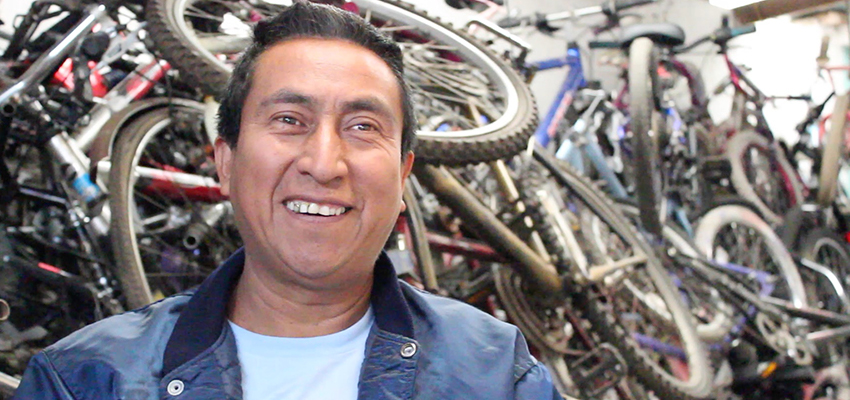
This is the first in a series of posts dedicated to highlighting notable innovators from within the International Development Innovation Network (IDIN). Through its International Development Design Summits (IDDS) and other activities, IDIN cultivates and supports a global community of local innovators using technology to address issues facing people living in poverty.
Carlos Marroquín had been working with pedal powered technologies for a decade before attending his first International Development Design Summit (IDDS). He was a main designer and fabricator for Maya Pedal, the NGO he founded in San Andrés Itzapa, Guatemala.
Maya Pedal took bikes donated from the US and Canada and transformed them into “bicimaquinas” (pedal powered machines) that served as corn threshers, blenders, water pumps, and several other uses (see photo on left for a woman operating a bicycle-powered blender). The NGO sold its bicimaquinas along with refurbished used bikes. Maya Pedal also offered a bike repair shop. The organization’s work was supported in part by the Boston-based organization Bikes Not Bombs.
Carlos was first contacted by Gwyn Jones at MIT’s D-Lab after several MIT students learned about Maya Pedal at a Bikes Not Bombs lecture and informed Gwyn of the organization and its work. Eager to learn more about Maya Pedal, Gwyn traveled to Guatemala to visit with Carlos in the spring of 2005.
Over the years that followed, Gwyn and Carlos stayed in touch regarding Maya Pedal’s work and in 2007 Gwyn encouraged Carlos to apply to the first IDDS. Carlos traveled to MIT to participate in the Summit that year, working with a team focused on designing a cooking stove that burned minimal amounts of energy and emitted minimal amounts of smoke.
“IDDS was good because there I met some of the Guatemalan university students who continue to support my work today,” Carlos says. “They come to my workshop to work on developing new technologies. More recently, they’ve helped me hold training sessions for members of the community.”
In addition to receiving support for his work, Carlos was also an inspiration to others. While Carlos and Bernard Kiwia, a 2007 IDDS participant from Tanzania and bike mechanic, were not on the same team Bernard was moved by Carlos’ work. For the first time it dawned on Bernard that he had the capacity to go beyond repairing bikes to inventing pedal powered machines. Bernard is now a full time inventor in Tanzania and identifies Carlos as an important influence on his work.
In 2008 and 2009 Carlos returned to IDDS as a mentor. “It has been a great way to get to know different cultures, experiences, and inventions,” he says.
More recently, Carlos has transitioned from working on Maya Pedal to starting his own for-profit social venture—Bici-Tec. In addition to marketing pedal powered machines, Carlos’ long-term goal for Bici-Tec is to establish an international school of appropriate technologies, including an education facility focused on bicycle technology and a center for community building and passing on traditional Mayan knowledge.
In addition to employing his three sons, Bici-Tec also counts on the support of Gwyn and Roberto Meléndez, an MIT graduate student in Mechanical Engineering and D-Lab: Design alum, who have helped Carlos to improve the venture’s financial system. “My plan is not just to make money,” Carlos says, “But to focus on building the community and sharing my knowledge of bicimaquinas with the world.”
-------------
Bici-Tec is piloting a training program for people who want to learn more about bicycle technologies in Summer 2014 under the Bici-Tec School for Appropriate Bici-Technology. Click here to learn more and to apply.

